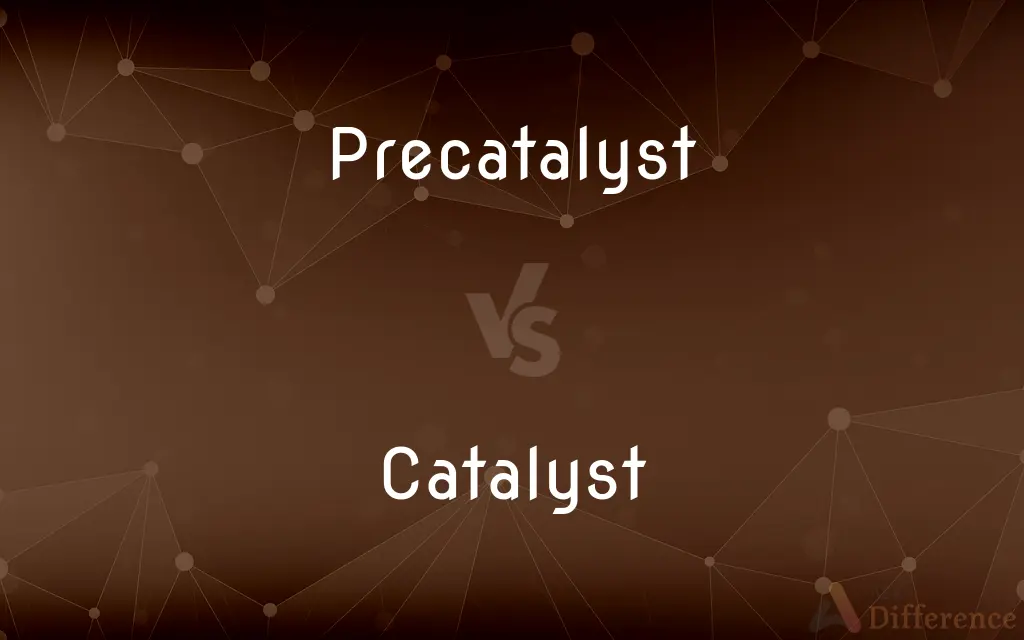Precatalyst vs. Catalyst — What's the Difference?
By Urooj Arif & Maham Liaqat — Updated on April 25, 2024
A precatalyst is an inactive precursor that converts to an active catalyst under specific conditions, essential for initiating chemical reactions, while a catalyst is a substance that directly accelerates chemical reactions without being consumed.

Difference Between Precatalyst and Catalyst
Table of Contents
ADVERTISEMENT
Key Differences
A precatalyst requires activation through specific conditions such as heat, light, or the presence of a co-catalyst to become an effective catalyst, which then participates in facilitating chemical reactions. On the other hand, a catalyst is already in an active form, ready to increase the rate of a reaction upon introduction to the system.
The use of a precatalyst often allows for greater control over the timing and efficiency of a reaction, as it remains inactive until desired conditions are met. In contrast, catalysts are continuously active from the moment they are introduced, potentially leading to reactions occurring prematurely or uncontrollably.
Precatalysts are particularly valuable in complex chemical syntheses, such as pharmaceuticals, where precise reaction control is critical. Catalysts are more broadly used across various industries, including automotive, environmental, and manufacturing, for their immediate and effective reaction enhancement.
Activation of precatalysts can also help in the stability and handling of sensitive reactions, preventing unwanted by-products. Catalysts, being already active, require careful handling to avoid undesired early reactions or degradation of the catalyst itself.
In terms of structure, precatalysts often contain ligands or other groups that are shed or altered during activation. Catalysts, however, are typically stable in their structure throughout their use in reactions, facilitating continuous reaction processes without structural changes.
ADVERTISEMENT
Comparison Chart
State of Activation
Inactive until specific conditions are met
Always active
Control Over Reactions
High, activated when desired
Lower, reacts immediately upon introduction
Typical Use
Complex syntheses, precise control needed
Broad industrial use, general reaction enhancement
Structural Stability
May change upon activation
Typically remains stable during use
Handling and Safety
Generally safer to store and transport
Requires careful handling to prevent premature activity
Compare with Definitions
Precatalyst
Designed to become active only when specific criteria are met.
This precatalyst activates only in the presence of a specific pH, ensuring reaction control.
Catalyst
Used across various fields for enhancing reaction rates.
Industrial processes often use catalysts to improve efficiency and reduce energy costs.
Precatalyst
Used in scenarios requiring precise reaction initiation.
In the synthesis of complex pharmaceuticals, precatalysts are favored for their controllable activation.
Catalyst
A substance that speeds up chemical reactions without being consumed.
Enzymes are natural catalysts that facilitate biological reactions.
Precatalyst
A chemical precursor that transforms into an active catalyst under certain conditions.
The research team used a rhodium-based precatalyst that required heat to initiate the catalytic cycle.
Catalyst
Does not undergo permanent chemical changes during the reaction.
The platinum catalyst remained unchanged after the reaction and was recovered intact.
Precatalyst
Often more stable and easier to store than active catalysts.
They preferred storing the precatalyst as it was less reactive and safer in the lab environment.
Catalyst
Can be used repeatedly in multiple cycles.
The catalyst was recycled and used in several successive reactions without loss of activity.
Precatalyst
Can be tailored for specific reactions to improve yields.
The chemist designed a unique precatalyst to increase the yield of the desired product.
Catalyst
Essential for environmental and sustainable chemical processes.
Catalysts are crucial in catalytic converters to reduce vehicle emissions.
Precatalyst
(chemistry) Any compound that is converted to a catalyst during the course of the catalyzed reaction.
Catalyst
A substance that increases the rate of a chemical reaction without itself undergoing any permanent chemical change
Chlorine acts as a catalyst promoting the breakdown of ozone
Catalyst
(Chemistry) A substance, usually used in small amounts relative to the reactants, that modifies and increases the rate of a reaction without being consumed in the process.
Catalyst
One that precipitates a process or event, especially without being involved in or changed by the consequences
"A free press ... has remained ... a vital catalyst to an informed and responsible electorate" (Robert O'Neal).
Catalyst
(chemistry) A substance that increases the rate of a chemical reaction without being consumed in the process.
Catalyst
Something that encourages progress or change.
Economic development and integration are working as a catalyst for peace.
Catalyst
(literature) An inciting incident that sets the successive conflict into motion.
Catalyst
(automotive) A catalytic converter.
Catalyst
(fantasy) An object that facilitates the casting of a spell (such as a magic wand).
Catalyst
A substance that initiates or accelerates a chemical reaction without itself being affected; as, thousands of enzymes serve in concert as calaysts to produce the sequence of reactions we call "life"; the industrial production of cheap ammonia depended on finding a good catalyst.
Catalyst
Something that serves as a precipitating occasion for an event; as, the invasion acted as a catalyst to unite the country.
Catalyst
Something or someone that causes events to happen with itself being changed.
Catalyst
(chemistry) a substance that initiates or accelerates a chemical reaction without itself being affected
Catalyst
Something that causes an important event to happen;
The invasion acted as a catalyst to unite the country
Common Curiosities
Can a catalyst become a precatalyst?
Typically, a catalyst remains in its active form and does not revert to a precatalyst state.
How is a precatalyst activated?
Activation can occur through heat, light, or chemical triggers depending on the system.
What are common examples of catalysts?
Examples include enzymes in biological systems and metals like platinum in industrial processes.
Why use a precatalyst instead of a catalyst?
Precatalysts offer controlled reaction initiation, important in sensitive or timed syntheses.
How do catalysts affect reaction rates?
They lower the activation energy needed for reactions, thus speeding up the reaction rate without being consumed.
What role do catalysts play in sustainability?
They help in creating more energy-efficient and less waste-producing processes.
Can precatalysts be reused like catalysts?
Generally, once activated, their reusability depends on the specific reaction conditions and stability.
What is the main difference between a precatalyst and a catalyst?
A precatalyst needs to be activated to function, while a catalyst is immediately active in promoting reactions.
Are precatalysts used in industrial settings?
Yes, especially in pharmaceutical manufacturing where reaction control is critical.
How are catalysts handled safely?
Catalysts require careful handling to prevent unintended reactions and ensure their stability.
Share Your Discovery

Previous Comparison
Sopranino vs. Soprano
Next Comparison
Heritage vs. OriginAuthor Spotlight
Written by
Urooj ArifUrooj is a skilled content writer at Ask Difference, known for her exceptional ability to simplify complex topics into engaging and informative content. With a passion for research and a flair for clear, concise writing, she consistently delivers articles that resonate with our diverse audience.
Co-written by
Maham Liaqat













































